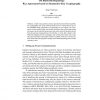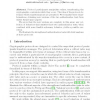719 search results - page 74 / 144 » Proving Security Protocols Correct |
CORR
2006
Springer
14 years 11 months ago
2006
Springer
Although good encryption functions are probabilistic, most symbolic models do not capture this aspect explicitly. A typical solution, recently used to prove the soundness of such ...
129
click to vote
CISC
2005
Springer
15 years 4 months ago
2005
Springer
Abstract. Despite many good (secure) key agreement protocols based on publickey cryptography exist, secure associations between two wireless devices are often established using sym...
CSFW
2002
IEEE
15 years 4 months ago
2002
IEEE
Important properties of many protocols are liveness or availability, i.e., that something good happens now and then. In asynchronous scenarios these properties obviously depend on...
ESORICS
2007
Springer
15 years 5 months ago
2007
Springer
Protocol participants manipulate values, transforming the cryptographic contexts in which they occur. The rules of the protocol determine which transformations are permitted. We fo...
102
click to vote
ASIACRYPT
2001
Springer
15 years 3 months ago
2001
Springer
Dynamic group Diffie-Hellman protocols for Authenticated Key Exchange (AKE) are designed to work in a scenario in which the group membership is not known in advance but where parti...


